#gentrification completed i guess
Text
RT is currently removing rvb off of youtube btw in case you wanna know how tone deaf they've gotten
#currently 9-17 are just completely gone#the original versions of 1-5 as well as 6-8 are on their main channel but not the animation one#currently only the first episode and first season complete uploads remain on the animation channel#which is so stupid. remember that channel was the rvb channel when it was launched.#gentrification completed i guess
29 notes
·
View notes
Note
here for the mandalorian rant ☕️
um well the first episode of the brand new season of disney+’s flagship star wars show was entirely... filler. the dialogue was incredibly bad, not even written badly but as if no-one had written it at all. entirely flat and devoid of life, in a show with a faceless protagonist whose dialogue literally has to carry all the weight. din continues to have no opinions, no emotion and nothing to say
as for the plot, what even happened in this episode? we open with the mandalorian covert ritually giving a child their helmet, but this is not explored at all, it’s only there to be interrupted with a giant monster fight for absolutely no reason, as if this show has been written by six-year-old me livening up clicking my barbies together by grabbing my toy dinosaurs. din has conversations with the armourer and bo-katan purely to rehash the information we’ve already been given, partly because half of it was in a bad show the casual audience won’t have watched. neither of these characters is doing anything.
din visits greef karga, who is now discount lando “gone respectable” but instead of having personality he’s just really into gentrification and this is presented completely uncritically. din, a character most charming for being the beaten up mercenary underdog of the galaxy, suddenly hates pirates and disorder (well, hates would imply he shows emotion—dislikes pirates and disorder? is mildly perturbed by pirates and disorder?), and pals around with high magistrates who offer him a position as a cop/landed gentry (they actually use the words “landed gentry”). there’s a couple of meaningless unfunny comic relief scenes because this is all that grogu is here for now, complete with a reference to, of all things, the rise of skywalker. in what is apparently the main plot of the episode, which is, i repeat, the first episode of the brand new season, din takes up a fetch quest to get a random droid part for an absolutely laughable reason that does nothing but completely negate a character arc from season 1 and everything we have been shown since, just reminding you that not even death will be allowed to have emotion or narrative weight, or prevent disney from dragging back onto your screen anything that will sell. he doesn’t actually do this fetch quest, btw, he just gets given it, because apparently we have to do multiple episodes of this
did i get everything? was that the whole episode? oh wait there was the fight with the pirates in space. i forgot it because there was zero tension. those pirates also earlier wanted to... have a drink in a school with greef, i guess, in a completely baffling scene? i can’t imagine there was any point to this pirate bit except to put fight scenes into this filler episode and force the visual effects people to carry the entire lumbering weight of this show. one has to assume that otherwise the pirates would have had personalities or motivations. oh, also purrgils appeared in this episode, because this is the Star Wars Cinematic Universe, and you’d better watch all the interconnected shows so all your beloved characters can eventually come together to swap lifeless quips on screen, just like you always wanted.
a droid drops a statue’s head on top of a murder droid to stop it, purely so din can say, “now that’s using your head.” if you were wondering what i meant about the dialogue.
i don’t even need to get into the politics of the story they’re telling. i don’t need to humiliate it further by comparing it to andor. it’s just bad to watch on a basic technical fundamental level, and it’s not headed anywhere better, because they will be churning out this story for cash forever with no goal or meaning, under circumstances where i cannot seriously even imagine caring about star wars anymore. hope this helps!
628 notes
·
View notes
Text
We Were Always Going to End Up Together - Ch 10
Suptober 22, Day 10: Enchanted
On AO3: https://archiveofourown.org/works/42237885/chapters/107429703
(Or read from the beginning: https://archiveofourown.org/works/42237885/chapters/106051008)
Their second date left Dean feeling just as twitterpated as the first, and then the third and the fourth were wonderful, as well as the coffee squeezed in on a Sunday before the maze opened. And then the maze was shutting down for the season and Dean went to Sam’s to help hand out candy (and push Sam’s raisins to the side). He always loved seeing how adorable the kids were and what creative things they came up with. His apartment complex didn’t have a lot of kids and wasn’t really the kind of place you’d want your kids going door to door at. Someday he’d have a better place, something not quite so suburban as Sam’s place, but not so far out in the country that he didn’t have neighbors.
Someday. For now his apartment was sufficient for what he needed and he had years ago decided that being able to put away a little each month was worth the rundown building he lived in. It was only a matter of time before the nice woman who owned it finally sold out to one of the groups dying to build some steel and glass monstrosity that began to price out all the folks that lived in this area. Dean hoped that day never came, but he wasn’t stupid. He knew that this would be prime real estate and the neighborhood ripe for gentrification if any of the larger buildings sold. At least Sam approved of the money he saved.
For the first hour of Halloween, it wasn’t even dark yet and the candy requests were a little sparse. Just after sundown it went from a steady stream to a nonstop deluge of children of all ages. Dean gave up on closing the big door, instead dragging a kitchen chair into the foyer so he could just watch out the glass storm door, and even then he only sat down a couple of times in almost 2 hours. Sam and Eileen would join him for awhile and then drift off and do other things. Dean was pretty sure that they’d keep the light off altogether if he didn’t come over to help out. Well, once he had his own place, it would be interesting to see if any of the local kids decided to egg the house if they didn’t keep giving out the good candy.
The hordes of children thinned out again when Sam rejoined Dean in the foyer.
“Trick or treating is officially over.”
“I’m going to stay a little longer just in case there’s stragglers.”
“I meant to ask you, how are things going with the guy you’re dating?”
“Cas? Things are great with him. We’ve been seeing each other quite a bit.”
“Is he still working the corn maze?”
“Last day was yesterday for the maze. He said he was going to spend today breaking all the decorations down, but then that’s it.”
“That’s good. That’s good.”
“Yeah, mean’s it’ll be easier to see him, since his weekends won’t be completely booked.”
“So, uh, when do we get to meet him?”
Dean looked at his brother. “I dunno. It’s only been a month. Less than a month.”
“Well, we would love to have him over for dinner sometime if you change your mind.”
“Yeah, okay.”
They didn’t say much more and after another ten minutes, Dean was ready to call it quits. After all, it was a Monday night and everyone had work in the morning. Dean drove home carefully, thinking about what Sam said, about meeting Cas. There was something uncomfortable that clenched in Dean’s chest at the idea of Sam meeting Cas. Probably because Sam thought it was his brotherly duty to interrogate anyone he dated and give Dean a full report on any of his detected deficiencies. Not that any of that nonsense had stopped all the trouble he’d had with any of his exes. Sam wasn’t super good at reading people, and especially not at reading men Dean dated.
His ringing phone interrupted those thoughts and Dean was delighted to hear Cas on the other end. “Hey Cas.”
“Hello Dean. Are you still at your brother’s?”
“On my way home now.”
“Mind if I stop by?”
“I guess not. Everything okay?”
“…Yes. I just… Nevermind.”
“No, Cas, not nevermind. What’s up?”
“Just a hard day. It’s nothing.”
“Hey man, it’s gotta be something for you to call at 8:30 at night and say you need to come over. You got a ride?”
“Yes. I’m actually at the coffee shop down the street from your place.”
“They’re still open?”
“Yes. I mean, no. They’re letting me stay while they clean up.”
“I’ll be there to pick you up in five minutes.”
“Dean, you don’t have to …”
“No arguing, five minutes.”
“Okay.”
Dean hung up the phone, looking around the area with a new focus. He didn’t like the uncertainty in Cas’ voice. This was no booty call, not that he minded being a booty call. This was something else and Dean was going to do his damnedest to help.
Four minutes later, Dean pulled up to the curb in front of the coffee shop, reaching over to pop the lock on the passenger seat door. Cas slid in with a wave through the lit window of the store at two waiting employees.
Dean patted Cas’ shoulder. “You okay man?”
Cas’ eyes were wider than usual, fear tinging the edges with a hunted look Dean hated. “I don’t know,” was all he said.
Dean drove the block and a half to his apartment building, sliding into his reserved slot at the end of the row. They left the car and walked up to his place without saying anything, Dean’s worry growing a bit with each step.
Once inside, Dean hung up their coats and poured a glass of water for each of them and carried them into the living room. He sat on the couch and patted the seat next to him. Obediently Cas sat, clearly not sure of how to start.
When Cas was seated, Dean scooched over to his side and threw an arm around Cas, tugging his solid weight into him. “Hey, man. Can you tell me what’s going on?”
“I’m sorry.”
“Sorry for what?”
“I didn’t know who else to call.”
“You did good, okay. You can always call me.”
“Gabe left town.”
“That was the plan, wasn’t it?”
“Yes, but it’s why I didn’t call him.”
“Okay. You called me, I got that. And it was the right thing to do. So now you’re here and I’m here.”
“I had a panic attack.”
Dean hugged Cas a little tighter to his side. “What can I do?”
“This is helping.”
Cas sat forward a little, forearms on his knees, head cradled in his hands. Dean began rubbing his back in what he hoped was a soothing manner. He hummed a little too, ‘Hey Jude’ like his mom used to sing to him before she died. That song still made Dean feel better, so he figured it couldn’t hurt.
“I’m sorry Dean.”
“Still not seeing anything you need to be sorry for.”
“Things have been so good with us…”
“Yeah?”
“And I didn’t want to screw anything up, but now here I am barging in on you…”
“Cas…”
“I didn’t want you to ever see me like this.”
“Well, I’ve had a lot of fun with you Cas, but that doesn’t mean I don’t want the rougher parts too. Hell, my life isn’t always so rosy either. I’m enjoying getting to know you. Even the messy bits.”
“What if I told you that what I really needed was to curl up on your couch with you and watch a Disney movie?”
“Well, then that is what we’ll do. Lucky for you I snagged Sam’s login for his account, so we have access to whatever one you wanna watch.”
“Really?”
“Sure, man. I mean, I’d prefer not to watch Bambi ever again, but if that’s your comfort flick, I’ll manage.”
“Is Bambi anyone’s comfort movie?”
“I dunno. I saw it when I was a kid and bawled my eyes out. And that was before my mom died. On second thought, yeah, no, not watching Bambi even if it is what you want.”
“I didn’t know your mother died.”
“Yeah, she uh, died in a house fire when I was little. It was a long time ago.”
“I’m sorry.”
“Thanks. So how about we change into some sweats and you can pick out which movie you want to watch.”
Cas nodded and Dean led Cas gently to his bedroom where they changed into clothes more suitable for relaxing. It didn’t take long until they were both laying on the couch while Cas manned the remote, clearly searching for something specific.
“Enchanted?” asked Dean. “Haven’t heard of that one.”
“It’s both live-action and animated.”
“It looks like a princess movie.”
“It is.”
“Cool.”
“And there’s a dragon.”
“Awesome.”
“But it’s a musical.”
“What’s wrong with that?”
“I thought you might object?”
“Why?”
“Because of the car, and the flannel and the everything.”
“Well, it’s not a core part of my personality or anything. But yeah, I like musicals.”
“Even if it’s a Disney princess musical?”
“Hey, I want you to feel better. And there are very few things that I’m not willing to try, movie-wise. Besides, it’s your turn to pick anyway.”
Cas pressed play and relaxed back into Dean’s chest. Dean wrapped his arm even tighter around Cas. He may not understand exactly what’s going on with Cas, but he knew how to help. This was easy, even if the movie wasn’t one he would have picked in a million years. He just wanted this man to be alright.
21 notes
·
View notes
Note
So, I also live in the Bay Area, and I obviously think that NIMBYS and zoning laws are a huge problem, but I'm also wary of any call to drastically reduce regulation and business costs - a lot of people seem to be arguing that the housing crisis is strictly an issue of the big bad Democratically Elected City Council beating up the Smol Well-Intentioned Housing Developers, and that if we just gave developers free reign to build whatever they want wherever they want things would be strictly better.
I'm not even sure that's wrong, but it's something I've been grappling with. What're your thoughts?
okay sorry it took so long for me to answer. first off, you have come to the right place with this question. I first got involved in housing advocacy in college—I signed a lease for my apartment 9 months before the lease began cause it’s that hard to find housing in the town my school was in—and learned that this is because the town basically didn’t build any housing for 20 years. thus began my yimby-pilling, and I’ve stayed involved in housing organizing since then. this is absolutely my pet issue—one thats connected to so many other issues (income inequality, racism, climate, etc) and i will yimby-pill anyone who gives me a chance to. warning, this turned into a very long essay but I hope you learn something.
first off, I understand the inclination to be skeptical towards deregulation and business interests. i am a democrat! it’s not in our nature to want to get rid of regulations! but the fact is that not all regulations are necessarily good. That said, completely deregulating building is not a solution (and I think you’ll find most people who identify as yimbys agree with that). Houston is a good example of somewhere that’s basically zoning-free, and what that’s resulted in is abundant housing (and therefore Houston is pretty affordable), but a lot of that is suburban sprawl—not the kind of housing we want! We’ve all seen this picture of Houston:

Sprawl is bad for the climate, environment more broadly, unpleasant to live in, forces people into cars, etc etc. But therein lies the problem—the type of housing that’s easiest to build (and in many places, the only type that’s even allowed) in this country is not the kind of housing we want (or at least not the ONLY type). But people need somewhere to live, and if they can’t live in cities, they will move out to suburbs where there is housing.
My vision of good housing policy is one that encourages building in cities and closer-in suburbs, and *discourages* it in farther-out suburbs and exurbs, especially the wildland-urban interface (WUI). So no, not all housing is good housing! We should not completely deregulate it and let developers go wild.
(quick tangent about the WUI, since it’s especially relevant to us as bay areans. you’ve probably noticed that there’s a lot of sprawl out in places like Vacaville, since that’s currently where you *can* build a lot of housing. you’ll also probably remember 2020 when the lightning complex fires burned down a lot of houses in Vacaville and made our air unbreathable for a month. As people move farther out into these areas, they get closer to areas that are likely to burn in fires and thus more people lose their homes and lives in fires. it also is more likely to lead to fires, since many fires are human caused—cigarettes, driving on dry grass, barbecues, etc)
TLDR here: not all new housing is good housing, new housing should be built in cities.
However, all that said, I’m guessing what you’re getting at with this question is more this: if we give developers free reign, won’t they just build a bunch of luxury apartments? Why do we want that? Doesn’t that cause gentrification?
to which I’d say yes, they would build a lot of luxury apartments! And that’s *not* a bad thing.
People are going to move to where jobs are. (Yes, this is complicated by the rise of work from home, but overall, people want to live near their work, and in general in areas of economic opportunity.) They have been moving to the Bay Area for tech jobs for decades at this point. And those people need somewhere to live. The Bay Area has done an absolutely terrible job keeping up with housing growth as compared to job growth, with a ratio of 3.6 new jobs to new units over the decade of the 2010s. https://economics21.org/bay-area-the-land-of-many-jobs-and-too-few-homes
there’s a concept called “yuppie fish tanks”—basically, those big new fancy glass towers. You put all the richer people who move somewhere in there, because if they don’t go there, they will rent other apartments—those in older buildings, those that are currently more affordable for low- and middle-income people. And because an engineer at Google can afford to pay more for an apartment in a small building in the Mission than the working class Latinos who used to live in that neighborhood, the working class gets pushed out.
“But wait?” you may ask. “Isn’t building those big glass towers gentrification?” Gentrification can mean a lot of things, but at its core what we should be concerned about is the poor and working class being pushed out of a neighborhood they used to be able to afford. The biggest problem isn’t a neighborhood full of $7 lattes, it’s the people who lived in that neighborhood being pushed out in favor of those who can afford $7 lattes. And in general, the order of operations isn’t a tower being built and then displacement—developers build where they see opportunity. Generally, richer people have already started moving into a neighborhood (because there aren’t enough yuppie fishtanks, and they can outbid current residents for rent), bringing with them cafes with $7 lattes. Displacement is already happening, then developers then identify this as a good place to build (and additionally, are less likely to face NIMBY pushback, since residents are usually less organized and have less time and incentive than those in wealthy white neighborhoods to oppose new housing). Neighborhoods getting more amenities isnt even necessarily bad—decreased crime and more access to grocery stores is a good thing!

Studies consistently find that adding new luxury housing supply helps rents, not hurts.
TLDR on this part: building housing generally prevents displacement, even if it is fancy new buildings.
“Okay fine,” you’ll say, “I get that we need some of these fancy new apartments. But why can’t we just build affordable housing too? Require them to build affordable units too! Inclusionary zoning!” To which I say yes! We need more capital-A Affordable Housing. (capital A meaning that the units are subsidized, not just that the units happen to be affordable). More permanent supportive housing for people who are currently homeless and struggling with mental health. More housing set aside for teachers, nurses, and other middle class jobs. More public housing in general.
Currently, developers are usually required to set aside a certain amount of their new buildings as Affordable housing, or pay fees towards affordable housing funds. So why don’t we just force them to be 100% affordable? Because then the developers would have no incentive to build. They are a business, and if they aren’t going to turn a profit on building, they aren’t going to build! 100% of 0 is 0. Which is why it is so deeply frustrating to see people who ostensibly care about affordable housing oppose projects because there’s not enough Affordable units—they are letting the perfect be the enemy of the good. This is the “how many affordable units did the Burger King have” theory of housing.


Inclusionary zoning (requirements for numbers of affordable units) is not evil, but done in the wrong way it can end up causing more harm than good with regard to housing affordability, if no units get built in the first place. So if we do want more Affordable units, more permanent supportive housing, more housing for teachers, etc, the government needs to build them. (And there are people working on this—check out Alex Lee’s bill AB2053 from this year, which was killed by squishy centrists :( but was supported by many YIMBY organizations, who recognize the need for more social housing). We need more funding for subsidized housing, and make it easier to build.
TLDR on this part: Yes, building new market rate housing is good, but there will always be people who can’t afford market rate even if that price comes down, and for that we need the government. Simply increasing requirements for affordable units can backfire
So, after all that, to provide an answer to your question.
No, developers aren’t necessarily well intentioned. They are a business. The way that our housing system is currently set up, we need those businesses to be able to conduct their business efficiently so that they can supply the demand for housing. There are a lot of actors—individuals, city councils, regulations, red tape—that make it so those businesses cannot efficiently supply the market. Attend any city council meeting where a new project is proposed and you’ll see what I mean. People will come up with any crazy reason to oppose housing. I once attended a city council meeting in college where a woman expressed opposition to a seven story building because she wasn’t sure how emergency helicopters would be able to go around such a tall building. Guessing she had never heard of manhattan? That project was in fact killed, due to NIMBY opposition. In another example from college that radicalized me, every project above a certain size in the town had to go to the voters. We worked our asses off to the the measure passed, it passed in 2018, but the project still hasn’t been started because the NIMBY-in-chief in town sued the project. Meanwhile there are students living in their cars. Because people are allowed to sue projects, because the process is so lengthy, projects don’t get built.
Is the market the way that housing should be supplied? Personally I think there should be a mix of both private and public development, and you’ll find a lot of smart people on various points of that spectrum. But the fact is that we are not going to transition to 100% public housing tomorrow, and therefore we need developers to be able to do their job efficiently, which they currently cannot do. San Francisco has started construction on a measly 660 units this year. Meanwhile there are over 7000 homeless people in SF.
The fact is that the process to build housing is too complex and lengthy right now, and bad actors have too many opportunities to deny housing, like the examples from college I just talked about. For example, here’s the process in Oakland.
And it’s gotten so ridiculous in SF that this week the state announced it’s investigating.
I think you’ll find that there’s not a lot of people in the broad pro-housing movement who think we should completely deregulate housing. There are people with a lot of different views but the broad consensus is that more housing is needed, period. And for there to be more housing it has to get easier to build housing. This means legalizing denser housing in areas where it’s not allowed currently (most of this country is single family only zoning, meaning the only thing you’re allowed to build is single family houses. Not even duplexes. Insanity!). And this means cutting red tape so that it doesn’t take so much time and money to build housing.
There’s a lot of great resources on these topics if youre interested in learning more—I’ll plug the stuff listed on YIMBY Action’s website
as well as Jerusalem Demsas’ writing in the Atlantic/
Darrell Owens’ substack
And if you want to get involved, find your local YIMBY group! Or just start showing up to city council meetings. if you let me know where in the bay you are I can suggest some places to start. Or if you have more questions, I love to talk about this.
if you made it to the end you are very brave. Sorry this turned into an entire think piece, please enjoy some memes:

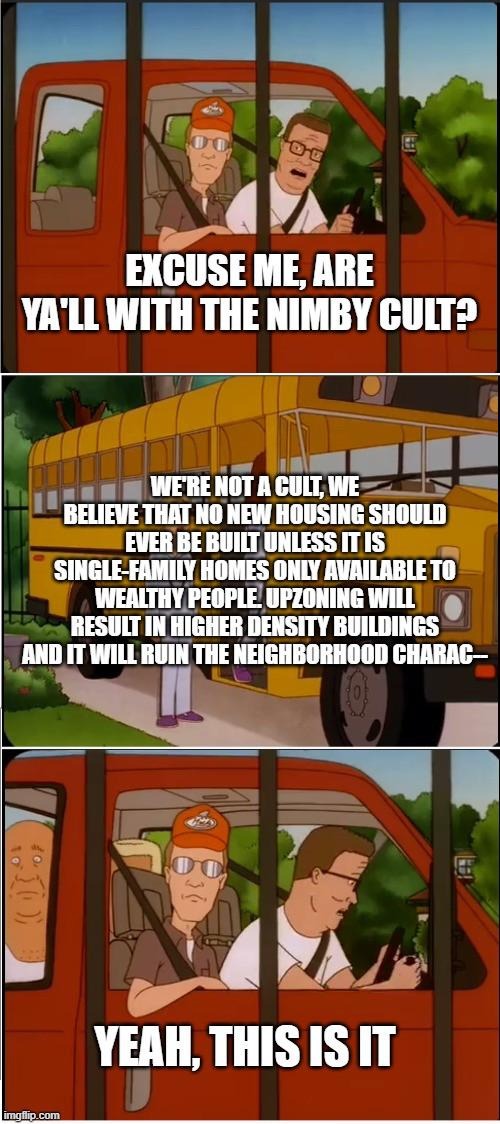

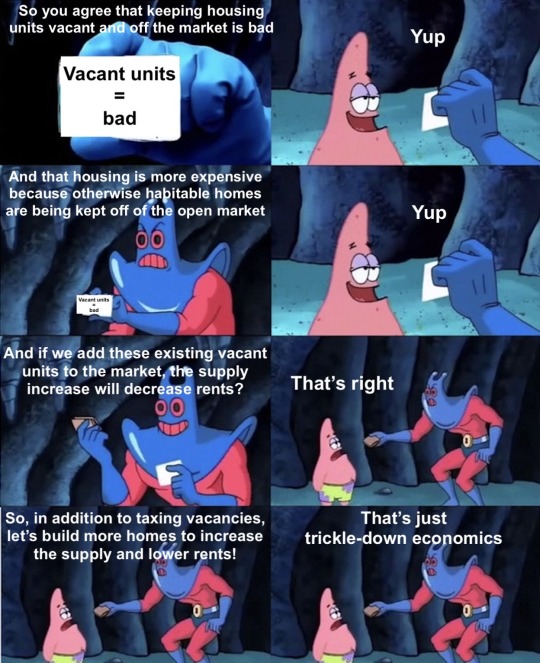
40 notes
·
View notes
Note
i want to chew glass when people erase all of morgan's good qualities because of moments that were like a one time thing, out of character/bad writing, or just him having human emotions
it's not to say you can never be critical of him, because you can and should
but I feel like people are completely unfair to him and just ignore how empathetic and kind and caring he is, along with ignoring how complex he is.
all of the characters suffer from moments that are like. unbearable. it happens in this shit ass show agshdjkfkghlk most of them get a free pass or get deep character analysis, meanwhile morgan is just taken at face value
idk man. jj gets away with being a bitch all the time. but god forbid morgan is a little disagreeable once or twice.
god i feel like the biggest problem with that is that he’s so uncharacteristically rude/mean/unempathetic at crucial moments for everyone else, and the times when he’s at his best, it’s either a) not a good episode or b) people still try to make him out to be the asshole
ok and ik the former is a matter of personal taste, but when i force myself to go through a formal rewatch where i skip no episodes, im always shocked by how many good morgan eps i typically skip. the outdoorsy one where garcia gets traumatized and derek wipes away her tears and garcia and jj yell at him for it 🙄 any of the eps w reids stupid fucking daddy issues 🙄 the ep where garcia gets shot 🙄 the ep where hotch gets exploded 🙄 the ellie episodes 🙄 the gentrification riot episode 🙄
he’s just suuuuuch a sweet fucking guy. and its not like these are his only good moments?? imo he has the best interactions with kids, especially the blind night at the museum kid in the big wheel and angel in that late season ep. i think he’s the best at connecting with people and making them feel at ease. he’s just so fucking genuine it makes me cry akdhakdjks like he really cares!!! idk i like to say that morgan and hotch both learned the opposite lesson from gideon’s downfall: hotch saw gideon care too much and get overwhelmed by feelings, so he was like “well i guess i’ll pretend like i dont feel anything”. morgan saw gideon care too much and get overwhelmed by feelings, so he was like “well i guess i just wont get overwhelmed. i’ll care anyway and i just wont do that”. which imo is a much more courageous endeavor. he really WANTS to do good bc he wants to help make peoples lives better. i dont think anyone on the team has as pure of intentions
13 notes
·
View notes
Note
what did you think of they cloned tyrone
It had a cool visual style. It's been referred to as neo-blaxploitation and I think that fits.
I really liked my husband's performance and it was cool to see him in a neighbourhood specific, unapologetically Afam scifi movie considering he got his start with Attack The Block which is a very neighbourhood-specific, South London scifi movie. It was also cool to see Teyonnah in this role because it was a very different role from Dawn in Mad Men or Monica in Wandavision so it was nice seeing her range. Jamie Foxx is always interesting for me to watch because he has great comic timing and I will watch him like that is a good joke or lol nice delivery but I rarely actually find him funny, he doesn't appeal to my sense of humour.
There were definitely things I did laugh at in the movie, like when they're formulating their plan to rescue Yo-Yo by simulating sex and then going over the script

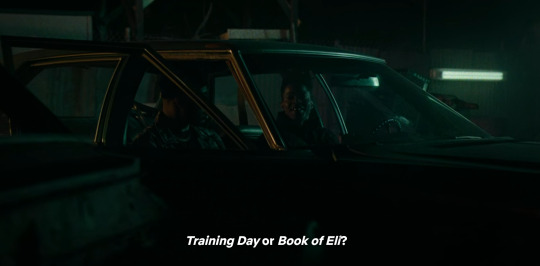
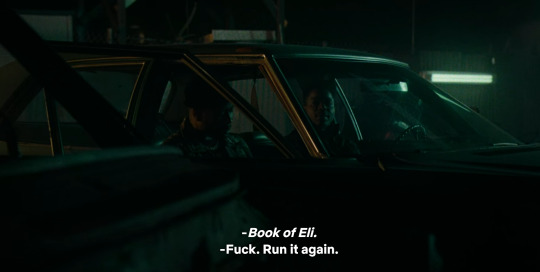
and the gospel rendition of Back That Azz Up especially since it sneaks up on you I was like, wait what?
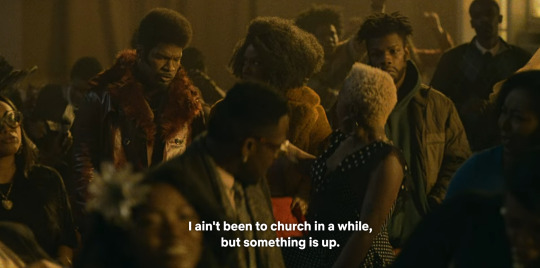
and I chuckled when they're in the elevator singing especially with my husband being the straight man in the scene (the reactions of the straight man are usually what make me laugh more than the goofiness)
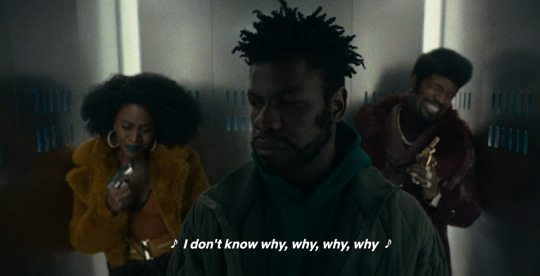
but for most of the movie I was like, I can see how and why this is funny but I'm pretty unmoved, like the thread with Kevin Bacon but I find it takes a lot for me to feel like running gags work. I didn't find the running gag in Don't Look Up about how JLaw's character was made to buy snacks that were free funny either.
In terms of the themes and messaging, I mean yeah. Like there are very direct callbacks to history of Black people being experimented on in the States (Henrietta Lacks, the Tuskegee Experiment, James Marion Simms experimenting on enslaved Black women) so that's there with the experiment plot

Government cloning Black men to repeat the same cycles over and over is akin to the systemic barriers in Black marginalized neighbourhoods that keep communities in the same cycles.
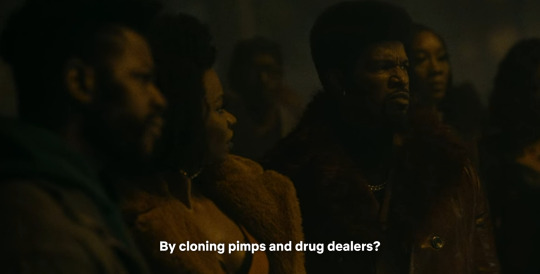
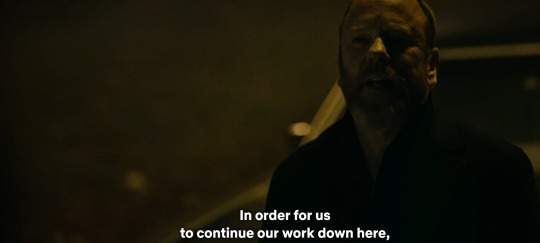
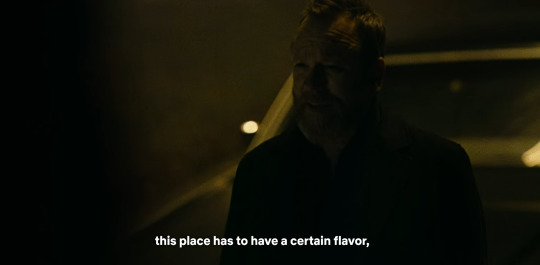


Yo-yo as a Black woman and a sex worker being considered disposable and worthless

despite the fact that she's the one leading the charge to get her community safe and when her being taken actually prompts Fontaine and Slick Charles d
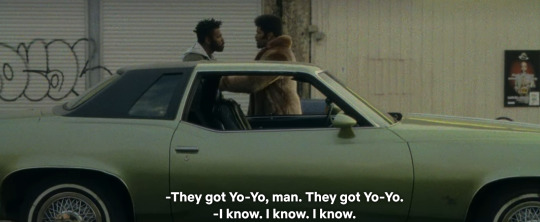
to galvanize the neighbourhood to come to her rescue and the rescue of others so the community will not forget Black women

Using things like perms with slogans like straight is great (I think that's what it was) are propaganda designed for white aspiration, which further makes sense when the goal is more than complacency but complete assimilation. There's been a lot on twitter about the [positive' parallels with Undercover Brother with the conspiracy of the chicken. There's also the book The Other Black Girl (haven't read it) and spoilers I guess, there is a plot line about indoctrination through hair products so I kind of shrugged at these aspects.
I wish they teased this out a bit more.


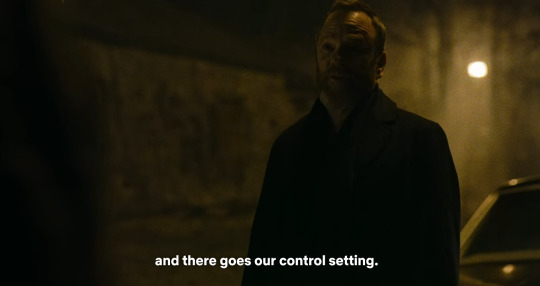

because the way the neighbourhood is now is a trap but gentrification isn't better either and I'm not saying that the movie is making the argument that it is because it isn't but I found it interesting that this was the line of dialogue they used and I get you can't get to everything in a movie but it also kind of felt like we didn't actually get to anything or really arrive anywhere? Like, in the end the pimps, the dealers, they all come together to save and therefore do some good in their community, which is meant to showcase that there's humanity and community and love in places that have been written off and it's better to band together but I was left wondering so what now, in a way I don't think the movie intended. Like it's an open-ended ambiguous finish, which is cool, I don't need things to be wrapped up neatly but it didn't feel like getting the clones out and being like they can't cover this up! was enough of a resolution with all of the different things the movie was pointing at.
6 notes
·
View notes
Text
"A Young Girl" by Kathy Acker (High Risk)
So that's what all the fuss is about!
I never liked Kathy Acker. I suspect it might have been timing. I either read her too early, before I wanted to read experimental novels or too late when the "cool" books of my college years were a little embarrassing. I saw her interview William S. Burroughs and she seemed cool but she wasn't writing anything that I liked.
Until I read this story and holy fuck this is amazing. This is raw and crazy and moves along at a speedy clip. It has all the misogyny of a Burroughs book but with Acker, you know she's depicting the nasty and angry mediocre men that she's been dealing with. So it's like Andrea Dworkin writing about her experiences with abuse and her assumption about hateful men but without the essayist need to tell you what it means.
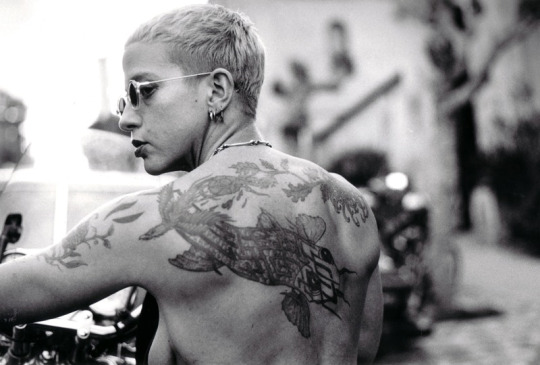
This is also a very 80s story in all the worst/best ways. Think Brett Easton Ellis without the smug cocaine stuff. Think the anger of AIDS victims knowing that the government is fucking them over. They aren't going to be singing on tables. They are living in the poorest neighborhoods but they aren't upset when the homeless people tell them to fuck off.
The young girl is being traded off between Mayor ______ and her dad. And who are we kidding, the mayor is obviously Koch who let the city go to Hell and bitched about graffiti. He wasn't the outright gentrification force of Giuliani kicking everyone out of their homes, but he was pushing for the gentrification process that Giuliani would complete. Also Koch was the gay mayor who hid his homosexuality and let the AIDS crisis get just as bad as the Reagan administration.
So it's the mayor and the artist fighting over this girl as she's watching and hearing them all be fucking horrible. The artist is the MALE artist who gets away with hurting women in the name of art. I'm thinking about Roman Polanski but there are so many of them in the world. And of course, he's one of those guys that fucks any woman he wants but if his wife steps out, he's violently divorcing her.
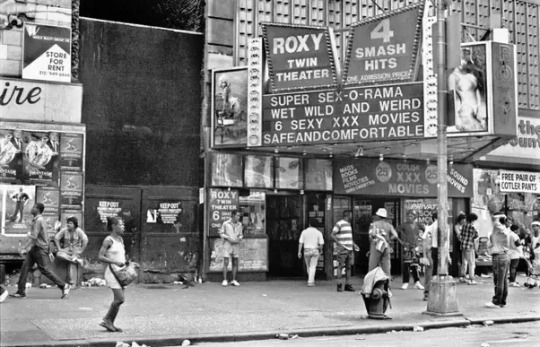
So the ending? The ending has the mayor helping the artist realize his vision of painting a dead or dying girl that looks like her daughter. The mayor claims that he found a corpse in the morgue but he just gets the daughter and ties her up in a car and sets it on fire. And her dad just draws and sketches and doesn't give a shit if it's her. She keeps saying that he doesn't see her, but more likely he sees her and doesn't care.
But the homeless rebel and she gets out and fuck those two.
I guess it's cool that Kathy Acker isn't immune to the happy ending. We've been dragging through the shit.
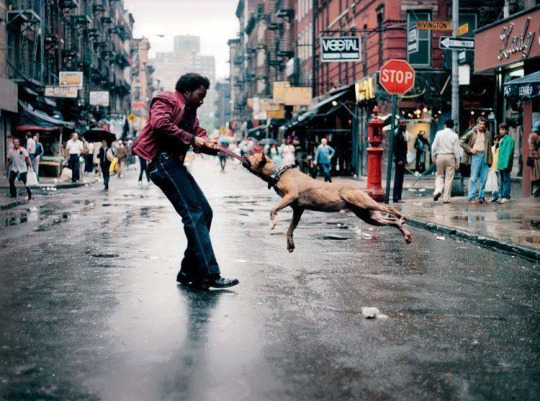
The one this this reminds me of is the Red Riding Quartet which is all about murder, murdering women, rape and violence with shitty protagonists doing stream of conscious vicious talk. Only the fact that a woman is writing it and the woman doesn't get sacrificed to the plot makes all the difference. I am reading Nineteen Seventy Seven and I love the way it's written but i hate myself for liking it. No such self-loathing with Kathy Acker.
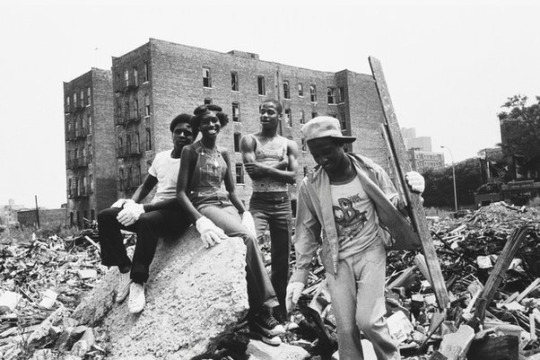
#Kathy Acker#High Risk#Nasty#evil#New York#Mayor Koch#Ed Koch#artists#misogynists#nasty people#homeless#slums#blood art#we are all damned#sinners all
0 notes
Text
Beautification and Gentrification: Grappling with the Consequences of Strengthening Adaptation in Urban Cities
New York City. The city that never sleeps, home to the world’s most diverse neighborhoods, eclectic and iconic spots… and exorbitant rent prices. For a city so unique, it’s disappointing that the one commonality it shares with almost every other metropolitan hub is its rising prices.
Where do I get off talking about rent when I’m living for free with my parents? Well, as I’ve made clear to all the people in my life, I’m a born and raised New Yorker. It’s obviously something I have a lot of pride about. And why shouldn’t I? For all its flaws, NYC has one of the best and most extensive public transportation systems in the US. I have access to food from all over the world (thanks to globalization, I guess). From the looks of it, I’m living the sweet life.
These days though, my conversations about living in New York are weighed down by clouds of uncertainty and anxiety. I unfortunately cannot live with my parents forever. So as my grad program comes to a very fast-approaching end, I am scouring the internet for jobs that fit my interests and pay a living wage. As I cross my fingers and submit application after application, I hope and pray that an employer will pick up my file from the online resume void.
Having to face the rising cost of living is definitely not an issue unique to me: a recent NYTimes article reported (a study conducted by Columbia University and Robin Hood) that 23 percent of NYC residents were unable to afford basic necessities like food and housing. Additionally, climate change continues to raze through waterfront and low-income communities that do not currently have the proper infrastructure to adapt to rising sea levels.
Back in undergrad, I created a podcast episode for my Architecture and Environment course about what I called the aesthetics of climate resilience in NYC. In the podcast, I argued that resilience efforts in NYC are embedded heavily in capitalistic efforts and thus need optics to promote the city as a climate-progressive space. I am not sure that I hold the same pessimistic view that I had just last year, but I do think that adaptation to climate change is a priority that NYC must address.
In a society entrenched in capitalism, any sort of infrastructural or architectural improvement in an urban city comes with harmful consequences. Green or environmental gentrification occurs specifically when urban greening projects have an impact on the housing market. Even outside of urban greening, any efforts to fortify or beautify the city will be exploited by those who can afford to. But where does that leave the people who can’t?
Displacement is rampant in NYC and to my knowledge, is not getting any better. Cultural institutions that have served residents for decades are being replaced with soulless profit-centered chains. Sorry to say it, but the city is looking like one big blocky glass house (and not a cool one like the original Crystal Palace in London or even the Farnsworth House by Mies van der Rohe). Gray and without charm, the city is slowly becoming my worst nightmare.
Last class, we discussed what our climate visions were. Of course, I dream of a world where we can achieve > 1.5℃ and completely decarbonize societies. I think my climate vision incorporates those goals. Ultimately, I would like for cities to be able to build climate resilience and beautify without gentrification. As much as this is a climate issue, my climate vision requires stringent housing policy and protections for lower-income NYers. I also don’t think that my climate vision is impossible. Everybody should be able to live in a city with efficient and equitable public transport and affordable housing.
Building climate resilience through adaptation initiatives is crucial now and in the near future. We see communities that are still recovering from Hurricane Sandy, over ten years after the fact. This is unacceptable. My climate vision for eco-cities devoid of unreasonable housing prices is absolutely possible. To do so though requires grassroots organizations and constant criticism of our local governments to do better. In my opinion, our current mayor (Eric Adams) could focus a lot less on building up the NYPD and more on addressing the pervasive inequalities that are more than evident across the city: affordability and access to basic amenities like public transport, housing, food, education, etc.
Affordable and climate-smart housing must be in the blueprint of NYC and other urban planning. Everybody deserves to live in nice, readily maintained neighborhoods. Living a quality life should not come at such a hefty price. Our prompt for Applications asked us what our climate visions are and what tools we might use to put them into action… The reality is that we need to mobilize to pressure local governments to care and enact change. We also need to empower our peers and communities and convince them that a future with beautiful and affordable cities is possible.
Affordable and climate-smart housing must be in the blueprint of NYC and other urban planning. Everybody deserves to live in nice, readily maintained neighborhoods. Living a quality life should not come at such a hefty price. Our prompt for Applications asked us what our climate visions and what tools we might use to put them into action… The reality is that we need to mobilize to pressure local governments to care and to enact change. We also need to empower our peers and communities and convince them that a future with beautiful and affordable cities is possible.
0 notes
Text
How to get a seat on a crowded train in Tokyo:
Assuming you’re not able to sit from the start, because you’re not getting on at the first station, this is a fairly reliable way to make sure you’ll get a seat at SOME point.
The secret, of course, is to stand in front of someone who’s going to get off before you do. But how do you know who that is? Well, most regular-looking businesspeople are probably taking the same route: into the major station at the end of the line in the morning, and back to the more affordable suburbs at night. So you have to find someone who doesn’t fit that pattern.
In the morning, your best bets are students in school uniforms and people wearing construction or factory uniforms. Some schools are in the middle of Tokyo, of course, but many are not, so percentage-wise you’ve got a better chance with a student than a guy in a suit. If you take the same train every morning, you’ll eventually start to recognize which uniforms go with closer schools, too. Factories and other similar workplaces need a lot of land, so those workers are also more likely NOT to be headed to the office district.
Night is trickier, but remember the golden rule of gentrification… older people and visibly wealthy people are good bets to be living in neighborhoods closer to Tokyo… so go for the elderly woman in the kimono or the obviously plastic surgery addicted trophy wife. Look for people plastered with labels… they’re more likely to care that their address is fashionable too. Failing that, people in their 20s aren’t a terrible bet either. Kids are bound by what their parents can afford, so hard to guess unless they’re plastered with brand labels. People of ages more likely to have kids of their own are also more likely to have prioritized space and affordability over location. But young adults are more likely to have prioritized proximity to work or school… so if I can’t find an older person or someone I’d put money on being a millionaire, I’ll go for a 20-something over a 40-something.
It’s not completely foolproof of course, but I get a seat EVENTUALLY more often than not just by being observant. You’re welcome! LOL
0 notes
Text
'Rich Men North of Richmond' is one big dog-whistle, not an anti-establishment anthem
"An overnight sensation" TikToker Oliver Anthony's sound and artistry can't be denied, but a few more things become undeniable as you dive into the lyrics of his break-out song. The elephant in the room is the title itself, but I would like to start with the first verse.
“I’ve been selling my soul
Working all-day
Overtime hours, bullshit pay
So I can sit out here
And waste my life away…”
Because this is what first falls into your ears and when I first heard it I was totally with it. The emotion and soul he sings these words with as well as the sentiment itself was something I was instantly in accord with.
If the message and tone stayed here, this would be a totally different review and I'd probably be an Oliver Anthony fan right now. But that's not how it went.
For a while I was paying more attention to the sound of his voice and instrument, which are captivating and stirring. I appreciate the old-school sound, the authenticity is a fresh contrast to the artificiality of mainstream music and contemporary country music specifically.
One line started to pull out the political analyst in me. He seemed to be blaming inflation on taxes? Oh, well. He's an artist not an economist. That doesn't detract much from his overall message…but the next line made me wonder, what is his message anyway?
He lost me completely in verse two which takes a decidedly reactionary turn with its first two lines:
“I wish politicians would look out for miners
And not just minors on an island somewhere”
I had flashbacks to all the times people who were "definitely not racist, but…" wanted to "take care of our own" before we did anything for those people. It's such a trope and I really don't have to explain it. The only thing in Anthony's favour are the words "not just", implying we can walk and chew gum at the same time, and that's the weak defence my mind rushed to before concluding: if that's what you really meant, just drop these lines — they just make you look bad.
Also, just what are your plans for making miners lives better? What if we invested in more solar and banned coal-burning energy and did job training to get them better, safer work, perhaps in solar energy? Maybe establish a Universal Basic Income to catch people who fall between the cracks. Which brings me to the part where it all fell apart for me.
He pleads with us that there are people on the street who have nothing to eat. True enough. Thanks to gentrification more and more people are being priced out of their neighborhoods and becoming unhoused. Corporations are buying up property across the country at an alarming rate and hiking the prices, making housing unaffordable for more and more people.
And while food insecurity is bad enough in urban communities it's actually worse in rural areas were the job market is crap, transportation is needlessly difficult and even people who are starving can't qualify for assistance. Wait — that's not what we're talking about? The fat people are eating all their food? Really? That's your take? Social media told me this was an "anti-establishment" song and that's your take?
Yes, would-be working-class hero Oliver Anthony is warning us that the obese are "milking welfare".
I guess we found out that "people like me and people like you" doesn't include minors on islands and fat people on financial assistance. Neat.
He is under the false assumption that unfortunately many people accept, that obesity is a personal moral failing. That it's due to overindulgence or a lack of discipline. and we now KNOW that's bullshit. It's been disproved. There are many reasons people can't lose weight and you can't look at someone and know if they are working hard enough on themselves to "earn" welfare. And you can't know what someone's regular diet is based on a single purchase they made. And it's none of our fucking business anyway.
I'd love it if Americas stopped eating so much damn meat. We have too much protein in our diets, it's making us sick, it's torturing animals, destroying the environment. Until someone dies and make you Food Lord, let the fatty enjoy their treat in the relative peace they can find in our ever-worsening capitalist dystopia.
Also, in my opinion there is no such thing as "milking welfare" unless you are committing actual fraud or are a corporation getting corporate welfare which shouldn't be a thing and pales in comparison to anything the poor are taking. Take everything you qualify for. Money is fake, our labour is exploited. The poor don't set the policies, the rich do. The poor don't decide what is offered to us for free. If we did, we'd get hot meals. The fact that food-stamps cover fudge rounds and not a hot meal is because the rich have decided it's better for them and their interests.
Anyway, everything I've gone into so far is nothing compared to the elephant in the room I alluded to from the start, the title itself.
"Rich men north of Richmond". It's a nice turn-of-phrase. It's catchy, sounds good and it's a poetic way to refer to politicians in our nation's capital which, referencing a map, is north of, and in relative close proximity to the city of Richmond, capital of the commonwealth of Virginia and…former capital of…the Confederate States of America.
As a former neo-confederate, Civil War history buff and reenactor, this aspect was the first thing that hit me when I saw the title and it stuck with me as I listened to the track in full. And the more I thought about the song in its entirety, the more the dog-whistle interpretation made sense and the less the innocent artistic explanation made sense.
A user on Genius.com commented on these lines of the song and how the song can be seen through the lens of the pseudohistorical "Lost Cause" narrative of the Civil War in which the North as aggressor, ruined the (slave) economy of the South, taking "total control" from the government in Richmond. The lines that go:
“Lord, it's a damn shame what the world's gotten to
For people like me and people like you
Wish I could just wake up and it not be true
But it is, oh, it is”
can be seen as a lament at the way the war ended, which the narrator blames for his current economic condition.
This insight does clarify some of the songs more (intentionally?) vague lines, for example "people like me and people like you" would then be a wink-and-a-nudge reference to white southerners. That seems to me to be the target audience and message of the song.
That's my opinion, I will include the links to the lyrics from Genius.com and I will include the annotations about the "Lost Cause" interpretation below. Read that and also read the lyrics in full and all the other annotations on the Genius.com page and make up your own mind.
Even if you don't ultimately come to the same conclusions, I hope you will see there are enough red-flags that concern is rational and valid and that Oliver Anthony should be viewed with caution and we should not be surprised if he turns out to be overtly problematic and reactionary.
Full lyrics with user-created annotations via Genius
Lost Cause interpretation:
"These rich men north of Richmond"
There are two viable explanations of the lyric. With Washington, DC being directly north of Richmond, Virginia, the lyric calls out leaders in both parties for presiding over an economic system that makes the rich richer on the backs of the rest of us.
Seen another way, it is a not-so-subtle reference to the Civil War, when Richmond, VA, the capital of the slave states in rebellion, sat just below the Confederacy’s northern border and just south of Washington, DC.
Richmond, the largest city in Virginia by far at the time, effectively formed the northernmost edge of the Confederacy. So, everything to the north of Richmond was enemy territory to the slave states. After the war, the defeated South adopted the “Lost Cause” narrative, which explained the loss in terms of a resource-rich North as the aggressor against a pastoral “Old South” whose enslaved humans were generally contented and well cared for.
"Lord knows they all just wanna have total control"
This continues the “Lost Cause” narrative of the title line. In the former slave states' Lost Cause explanation of the Civil War, it was not slavery but, instead, freedom that inspired the South’s rebellion against the United States. Preeminent historian of the Civil War James M. McPherson explains:
"The theme of liberty, not slavery, as the cause for which the South fought became a mantra in the writings of old Confederates and has been taken up by neo-Confederates in our own time."
While contemporaneous rhetoric of Confederate leaders made clear that the preservation of slavery is what provoked the Southern states to rebellion, the Lost Cause myth, developed after the South’s defeat, sought to revise history to insist that the North’s desire for control caused the war.
1 note
·
View note
Text
Today is a frustrating day.
Went to get my prescriptions and that went well. Then I got to go to value village after begging my roommate.
Friday must be the day they put out new stuff because there were a ton of parasites there. Thrift flippers. The scalpers of the secondhand world. People who buy everything even remotely worth anything from thrift stores and then toss them up on etsy for super inflated prices. And they can afford to buy the entirety of X Y Z in value village all at once because they're upper middle class at the lowest. They're the justification thrift stores then use to super inflate their prices to near ebay rates also. And it leads to things in glass cases and security guards and essentially gentrification. And the end result is the people who actually rely on thrift stores having a harder time. God how I fucking hate them. There were two specifically that really grinded my gears. One had two carts. One piled HIGH. to overflowing. With toys. and they were an ultra mega bitch to the kid they brought with them. And pretty much anyone who entered the toy section also. The kid wanted to keep one stuffed animal for themselves from the literal mountain of toys and the grown ass adult was giving them shit and finally relented with a "shut up and put it in the keep pile then." if you have to differentiate a "keep pile" when going to a thrift store you shouldn't be going to a thrift store. Join a pyramid scheme for your military spouse #girlboss side hustle or whatever the fuck you cunts did before the invention of poshmark. Die.
The other thrift flipper had also taken it upon themselves to clear out the trinkets section and had put every single music box in their cart and then they left their cart in the middle of the isle and fucked off somewhere. You know what I did? I took one (1) music box from their cart. I'm kicking myself I didn't take another because I fucking hate these people so much. Price gougers and thrift flippers and scalpers deserve electric chair.
So I leave with my music box and should have been in a much better mood because I got to explore the thrift store today but instead I'm reminded that people who suck exist. It's like having to breathe the same air as a landlord. I guess they're more human than landlords are. Barely.
Then on top of that my roommate got mean to me. I don't know if he tried to gaslight me or if he just forgot but he acted like he was justified in taking all my recycling money from my bottles and cans by telling me that I "didn't put the bottles in the bag" when I distinctly remember doing that. Maybe Scott dragged the bottles out of the bag who knows. But he was going off at me for wanting to go to the thrift store and wanting my bottle returns and such. I was defending myself but had to stop when a complete stranger approached him for some fucking reason to talk about stupid fucking alcohol.
Am I irrationally going of the deep end? Yes. But I'm not doing well mentally.
Also the entire time I've been writing out this vent post my roommate has been pestering the hell out of me to send him "everything you have on PayPal" as if I somehow owe HIM money. I'm not going to obviously.
Christ.
0 notes
Note
A5, B8
A5. Are you more mature than you seem? Less?
How we defining mature here? Wanna say I’m more mature than I seem, or act, or whatnot, I’ve seen and been through a lot. Spent a long time being highly reserved and watching all the ills of the world behind the thin barrier of obfuscate. Being withdrawn might of socially stunted me, but I got a hell of a lot more maturity than a normal twelve year old. More than some adults I’ve seen even. So even if I sometimes go mute, zone out as Fish, or ‘tactically ignore’ someone I’d say I’m doing well!
B8. What motivates you?
I am looking at my feet and shrugging at you with the maturity of a scolding 12 year old asked what they plan to do with their life.
Right now or?? Cos I can give the running summary.
I used to be motivated by some kind of protective instinct. The gang Len abandoned and I was trying not to eat but wanted to make sure would be okay. Then that turned into being Fish. Which turned into a general sense of being a symbol for good. Then that faded, then I was just finding greater security challenges to go up against to entertain myself with the thrill of successfully getting into places. Then gentrification really took off, and the SI started coming in and things got stressful and London didn’t feel like home anymore. Turned focus to getting answers about why I had been killed. Went off on a goose chase. Found the goose. Did blood stuff with the goose. Decided actually I really like the goose and I get why the goose did evil goose things. Made more friends via the goose. Now? I dunno. Just looking out for the goose I guess and trying to have fun till the goose pecks me so hard I die.
My greatest motivation currently is finally completing the ghost look for Fish by learning to levitate, which I’m slowly making progress on :)
0 notes
Text
it’s really windy and rainy here, or at least it was hailing like 20 minutes ago it seems to have calmed down. it’s also bin day though, so ive had the pleasure of watching recycling bin bags race each other across the street with the wind
one of them made it to the other side unharmed. lucky for it, as its companion/competitor was not so lucky: alas it is a busy road, and cars are not willing to stop for pathetic beasts such as wet recycling bags. it got completely shredded, obliterated, all its contents spilled out into the street. some of it immediately got wet on the road and thus stuck to the road and was made immovable. some of the rest of the trash took advantage of the high wind speeds and continued its quest to reach the other side, including the now-empty bin bag, inflated now with the winds towards a better life. A whole lot of the trash got stuck in the curb. Some of it gently deposited itself on the pedestrian sidewalk. Overall this has improved the scenery greatly and may even hinder gentrification efforts. i wish to see more of this but its stopped raining and seems less windy now: welcome to wales, i guess
#i need a tag for my own rambles#welcome to wales#where if u dont like the weather#dont worry!!! just wait 5 minutes
0 notes
Text
You can drain the water but the swamp remains.
The Great Dismal Swamp on the eastern coast of the US used to occupy a range of what is now estimated to be over 1,000,000 acres. With the completion of the Great Dismal Swamo canal in 1805 the swamp was drained to approximately a third or less of its original size, leaving behind swathes of sandy soil later appropriated for farmland and industrial logging. Driving through Southeastern Virginia even at a distance from the swamp’s proper boundaries will reveal a landscape accustomed to standing water: nigh any divot in the landscape will be occupied by a pool or a puddle of some kind. Even the persistently logged tree stands demarcating fields of cotton, peanuts, or soy beans will under closer inspection reveal a gradual shift from eastern white pines and scrubby briars to cypresses with their knees perched at the surface of black water.
Further north, occupied the greatest and most terrifying city on the East Coast, the island of Manhattan was once home to an abundance of ponds, marshes, and natural springs. Collect Pond, perhaps the largest and deepest of the island’s original bodies of water, once occupied 40 acres and was fed by a natural spring. The original area of the pond is now only memorialized by a park the size of a half-block bordering the city’s civic center. An ephemeral pond is the hallmark of the park, but more often than not its bed hosts flocks of roving pigeons instead of the water its namesake suggests.
It is well known, however, that buildings in the area are especially prone to flooded basements. Most infamously of these are The Tombs, a penitentiary across the street from Collect Pond Park. Built, demolished, and rebuilt no less than four individual times, each new iteration of the tombs seems condemned to sinking foundations and foul conditions. Deep underneath these city blocks, is it really such a stretch of the imagination to consider that original spring still might yet flow?
Consider further the history of Canal St, which true to its name once was the site of a canal that itself was dug as part of the effort to drain Collect Pond. In the summers a smell hangs over the area that can only be described as miasmic, unexplainable for its unique intensity despite the hot garbage, cheap restaurants, and sewer grates that also occupy every other part of the city. Even I, four stories high in a walkup a few blocks north of Canal, can’t escape the mosquitoes that cloud the area from July to September. Despite the overwhelmingly cynical attitude of every old new yorker towards the mechanical encroachment of gentrification into the area, the neighborhood can’t shake the ghostly presence of water that sat here almost two centuries ago.
Back in rural Virginia, where the air is cleaner and the planets shine at night, every small parking lot has a holding pond to the side and every grandmother complains about the pools of water out back. While surveying the land in 1728, William Byrd II described the swamp as “a miserable morass where nothing can inhabit.” The statement rings true today if only in the landscape brought about after centuries of industrial agriculture. I’ve chosen not to look up the current figures, but I remember back in 2019 an article about global insect density being a third of what it had been only decades before, and a second article months later detailing a similar situation in regards to the world’s population of birds.
There’s no real wrap up for this essay, no good moral that I could spin. I’m just depressed and thinking about lost waters. Still, I guess what I can end with is that ghosts are always with us, and whether or not we can see the death that sprung them into existence, their absence will be felt.
1 note
·
View note
Text
I’m going to be honest, some of the conversations in our movie/documentary groups on Monday didn’t sit right with me afterwards and I really wish I came more prepared to defend my views on why gentrification is bad. At the same time, I didn’t think that would be an opinion that needed defending, but I guess at a place like Penn, where a lot of students don’t spend a lot of time in displaced and struggling communities that continue to stay that way because of social structures that harm them more than they support. Looking back, I would’ve talked about what actually causes crime outside of proximity between the “bad neighborhood” and Penn that a person in our group relied his judgements on. Or how Penn's expanding presence in West Philly is detrimental for everyone. As much as I agree that gentrification shouldn't always be seen as a villain narrative, that doesn't make it an anti-hero either.
In that class period, neighborhoods like Kensington (in juxtaposition to Fishtown) and Point Breeze were brought up. It always interesting to me to hear non-Philly natives talk about them as visitors since I went to middle school in Kensington and walked to the park on Tioga pretty regularly, and my grandparents live in Point Breeze. As much as I like the attention given to Point Breeze in the conversation, it felt somewhat voyeuristic for someone to talk about it and the residents there and emphasizing the conditions there to glorify their point. Communities don’t want to think of their homes as decrepit and unlivable; they don’t want to be known from that lens.
This weekend, I'm planning on completing a landscape assignment for my intro to photography class by traveling around the city and taking pictures with "gentrification" as my theme. Initially, I thought it was going to take me a while to find varied places around the city, but after some thought, I realized that I know and have been raised around plenty of places affected by gentrification. The Hơa Bình Plaza on Washington and the surrounding area, Kensington and Fishtown, Spring Garden and Broad near CCP, and, of course, Penn. It may not seem like it's happening in the eyes of college students who are only here for 4 years, but when I return to these places that I grew up around, it's startling.
1 note
·
View note
Text
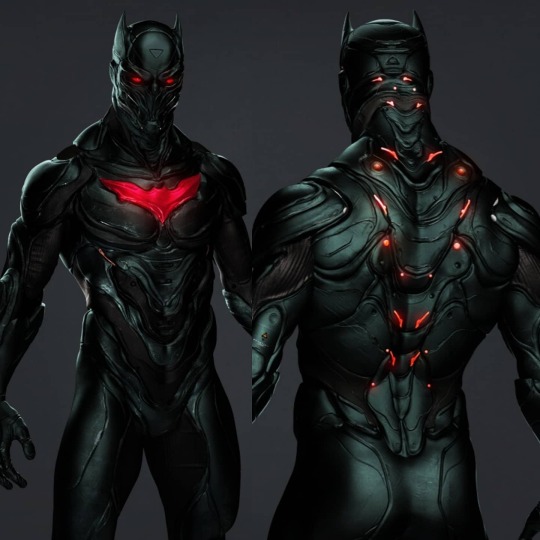
LBascially before Beuce starts as Batman, Gotham already turns into this vaguely No Man's Land type of state that is very reminiscent of that specific arc though it is not entirely the same. I just mean that Gotham would have entered a state where martial law is almost declared, and while the whole city does not completely lose funding and get declared no longer a part or the united states, this almost happens basically. Gotham city is just really full of gangs and crime
But really there used to be a lot more honor among criminals and this still exists to some extent but since the death of the Wayne's something fundamentally changed in the city and this is also blamed partially for leading to the creation of Batmans villains just as much as anything else the effect that this has on the city .
Ike I said, it's not completely like No man's land, but it is very similar. Basically Gotham simply becomes very independent from the rest of the country. Back in Gothamms past, some of the most wealthy and influential citizens of Gotham got together and created shares and took very concentrated effort to ensure the survival of the city I to the future so these very protective measures were taken.
Thus the city is relatively independent, with what that means, crime is,more easy to flourish and exist here though that's not the reason, the reason is that Gotham is kind of a n exaggerated portrayal of some aspects of America in how it values it's independence, it'd kind of like a mixture of New York but also Las Vegas. I guess there would be some Western type of genre aspects here as well as the city struggles for it's independence. It then makes sense for Gotham to be this kind of stereotypical American town. Really, the reason for it's independence would almost be too offensive and upsetting to regular audiences so it would have to be kind of downplayed, it is not necessarily right wing or conservative or anything though.
I think because of it's independence, you would have a lot more free business enterprises, business does exist in Gotham that is not all a part of the big corporations and conglomerates and this is very much a part of the story. The part of Gotham that is less free probably has more conglomerates, rich foreign investors, gentrification and the like. This is also where the socialist wing in Gotham kind of comes into play, Arkham asylum is basically just like a socialist answer to the problem of crime and they attempt to rehabilitate the criminals and consider crime endemic to social inequality. Gotham at times is basically looked at as this mentally ill city and place where a large portions of the citizens are just mentally ill for,the outside public that's what the explanation is though it doesn't explain the whole truth of the matter. Gotham bascially attempted to hide much of it's crime problems from the outside eyes of the public and the rest of the country hence part of the reason for it's independence so that it can hide the problems it has with criminality. Almost the entire city is in a gang, involved in criminality in some way or has something to hide.
Gotham is really a complex microcosm of a place, you have a lot of big corporations though who get there start in Gotham because of the lax rules and free enterprise that exists in the city. There is a real and competitive free market in Gotham but also due to the criminal element that exists corporations can expand their business dealings in a more profitable way if they so desire.
Due to Gotham have all the social problems it has there is a real socialist wing in Gothma but it tends to have a negative side as well with major criminals simply being written off as mentally ill and diagnosed then facing harsh prison time.
0 notes